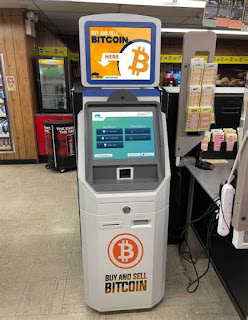Are Bitcoins ATM's Safe
By Laurie Suarez www.lauriesuarez.blog
Understanding Bitcoin ATMs
Bitcoin ATMs (Automated Teller Machines) are physical kiosks that allow users to buy or sell Bitcoin (and sometimes other cryptocurrencies) using cash or debit cards. Just like your traditional bank ATM, right? Well, not quite. While these machines perform similar functions, Bitcoin ATMs deal with a decentralized, digital currency - opening up new avenues and, unfortunately, some potential risks.
Bitcoin ATM Security
General Security Concerns
Bitcoin ATMs, like any other digital transaction system, are susceptible to security threats. Phishing and skimming attacks, physical and remote tampering, and even simple human error can lead to security breaches.
Phishing and Skimming Attacks
These are tricks designed to steal your Bitcoin or your personal information. Phishing is when an attacker lures you into giving your private information, often through a fraudulent screen that looks like the ATM interface. Skimming, on the other hand, involves capturing the data from your debit or credit card's magnetic strip, usually through a device attached to the ATM.
Physical and Remote Tampering
Hackers can physically tamper with Bitcoin ATMs, installing devices that capture card information or even Bitcoin transaction data. Remote tampering involves hackers accessing the ATM's software to alter its operation or steal data.
Technological Measures for Safety
Despite these risks, Bitcoin ATM operators take several measures to ensure the safety of their machines and the transactions processed through them.
Encryption
Every Bitcoin transaction is encrypted, ensuring that the information exchanged between the ATM and the Bitcoin network cannot be intercepted or read by third parties.
2-Factor Authentication
Many Bitcoin ATMs implement 2-factor authentication (2FA) to provide an extra layer of security. This usually involves the user confirming their identity via their smartphone after entering their information into the ATM.
KYC/AML Compliance
Bitcoin ATMs often follow Know Your Customer (KYC) and Anti-Money Laundering (AML) regulations, requiring users to provide identification information. While this might feel invasive, it’s a crucial step towards preventing illicit activities.
Human Factors Contributing to Safety
Educated Users
The most potent security tool is an educated user. Awareness about potential threats and how Bitcoin ATMs work can significantly reduce the risk of falling prey to scams.
Attentive Staff and Regular Maintenance
Operators should ensure their ATMs are in good working order and regularly check them for signs of physical tampering.
Pros and Cons of Using Bitcoin ATMs
Pros of Bitcoin ATMs
Bitcoin ATMs offer convenience and relative anonymity. Transactions are often quicker than online exchanges, and while KYC regulations may apply, they’re usually less stringent than online platforms.
Cons of Bitcoin ATMs
Security threats are a significant concern, and Bitcoin ATMs often charge higher transaction fees than online exchanges.
Safety Measures When Using Bitcoin ATMs
Before Using Bitcoin ATMs
Research
Before you use a Bitcoin ATM, it’s essential to research the operator. Are they reputable? Do they have a good track record when it comes to security?
Check for Physical Tampering
Before using the machine, give it a quick once-over. Are there any suspicious devices attached to it? Does anything about the machine seem off?
While Using Bitcoin ATMs
Secure Network Connections
When using a Bitcoin ATM, ensure you’re connected to a secure network, especially if you need to access a digital wallet or authenticate your transaction.
Be Alert of Surroundings
Watch for people watching you, unusual signs, or warnings around the ATM.
After Using Bitcoin ATMs
Regular Wallet Monitoring
Keep an eye on your wallet and make sure the transaction goes through as expected.
Be Aware of Transaction Confirmations
Bitcoin transactions require network confirmations. Ensure you understand how many confirmations are necessary and that they all go through.
Future of Bitcoin ATMs
Technological Advancements in Security
With advancements in AI and machine learning, we can anticipate enhanced security measures in Bitcoin ATMs.
Role of Regulations and Compliance
Increased regulatory scrutiny can lead to safer, more secure Bitcoin ATMs, improving user trust and promoting widespread adoption.
Conclusion
The question, "Are Bitcoin ATMs Safe?" doesn't have a definitive yes or no answer. Bitcoin ATMs come with their unique set of advantages and security risks. However, with adequate research, proper precautions, and an understanding of how these machines work, users can safely and securely transact with Bitcoin ATMs.
FAQs
Are all Bitcoin ATMs the same? No, Bitcoin ATMs can vary significantly in terms of fees, limits, and even security measures depending on the operator.
Can I get my money back if a transaction goes wrong at a Bitcoin ATM? Bitcoin transactions are irreversible. However, if there's a problem with the ATM, contact the operator immediately.
Is it safer to use a Bitcoin ATM or an online exchange? Both have their unique risks. What's important is to research, use secure connections, and regularly monitor your digital wallet.
Do Bitcoin ATMs require ID? Some Bitcoin ATMs require ID as part of their KYC procedures, but this can vary from one machine to another.
How can I find a trustworthy Bitcoin ATM near me? Research online, read user reviews, and consider using a locator like Coin ATM Radar to find a reputable machine near you.



Comments
Post a Comment